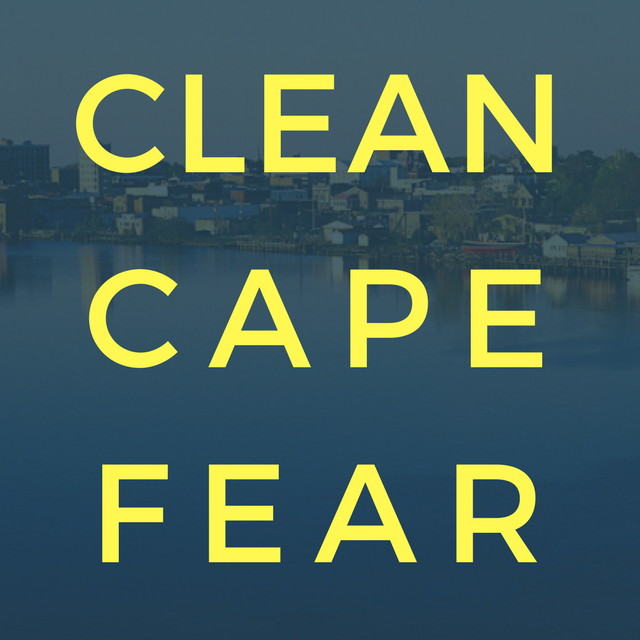Simple Steps
Last week, four NC senators (two who sit on the Senate Committee on Water Quality) sent a letter to the EPA, asking them to work with our NC Dept. of Environmental Quality (DEQ) to "advise on the adequacy of the North Carolina programs to protect public health and the natural environment."
Dear Senators Lee, Rabon, Wade and Wells:
Are the current programs adequate enough to protect public health and the natural environment? We're not sure why you would ask the EPA; some of your constituents can answer that for you - you know the 300,000 or so of us living near the plant (in your district Sen. Rabon) and downstream of it (in your district Sen. Lee) who found out eight months ago that DuPont and Chemours have been poisoning our drinking water for 40 years: THE ANSWER IS NO.
Ok, now that we got that out of the way, can we move on and get to work on making the programs adequate?
The Southern Environmental Law Center (SELC) sent you a letter in which they provided some simple legislative steps to do just that. We anxiously await your direct action. Our dirty water is due to dirty laws and dirty politics. Your constituents are learning more and more about the heavy hand that corporations hold over you (and our federal EPA for that matter). We are not falling for these distractions.
In your letter, you asked the EPA if our NC state laws limit DEQs regulatory authority on this issue!!! It's pretty gutsy to admit that you - the lawmakers - don't even understand your own laws. Gutsy and frightening. Let me clue you in: your citizens are frightened enough wondering if our kids might get cancer or if our miscarriages were caused by the water. In an effort to help you with your homework and maybe quell our fears that you just don't have the necessary information to do your jobs, we've shared below the SELC's simple steps, extracted directly from their letter. We're sure the staff at SELC will be happy to explain these to you if you still need help.
The NC Senate must:
- Stop pushing the House to pass House Bill 162 [which would make it nearly impossible to implement environmental rules if the cost TO THE POLLUTER is too high]
- Pass House Bill 189 [to provide DEQ adequate funding to do its job]
The NC General Assembly must:
- "...restore DEQ’s authority to regulate air emissions that pollute state waters by repealing the limitation placed on the definition of “discharge,” which currently excludes “emission[s]” in G.S. 143-213(9) which was established in 2012 by the N.C.G.A. in S.L. 2012-187.
- "Repeal G.S. 150B-19.3, the “Hardison Amendment,” which prohibits agencies authorized to implement and enforce state and federal environmental laws from adopting regulations for the protection of water quality, the environment, or natural resources that impose a more restrictive standard, limitation, or requirement than those imposed by federal law. North Carolina environmental agencies should have the flexibility and authority to enact protections for water quality and drinking water to protect the people of North Carolina based on the State’s needs and circumstances.
- "Amend G.S. 143-215.1(c)(1) (Applications for Permits and Renewals for Facilities Discharging to the Surface Waters) to require applicants for permits or renewals of permits to monitor for and disclose all pollutants contained in the discharge by Chemical Abstracts Service (“CAS”) Registry number. Pollutants that do not have a CAS number must be sufficiently identified so that the Department of Environmental Quality can understand its chemical formula/structure.
- "Amend G.S. 143-215.1(a) (Activities for Which Permits Required) to prohibit permitted facilities from discharging any toxic substances, as defined by 15A N.C. Admin. Code 2B .0202(64), for which the EPA or State has not promulgated a health or effluent standard. If a chemical does have a health or effluent standard, or a consent order entered by the EPA under the Toxic Substances Control Act (“TSCA”), then the applicant must comply with whichever is most stringent. This provision shall not apply to municipal waste water treatment facilities.
- "Amend G.S. 143-215.1 to require automatic permit suspension if a company is found to be discharging any pollutant (1) not authorized by its permit; and (2) not disclosed in its permit application in its ordinary course of business.
- "Amend G.S. 143-215.1 to mandate that a company in violation of its discharge permit must provide and maintain the necessary filtration/treatment to municipalities downstream of polluted discharges for as long as contamination persists in the environment and to clarify that a company in violation of its discharge permit is financially responsible for the removal of their discharged pollutants from drinking water sources so that this burden does not fall to North Carolina’s taxpayers..." -- Senior Attorney, Geoff Gisler, Southern Environmental Law Center
